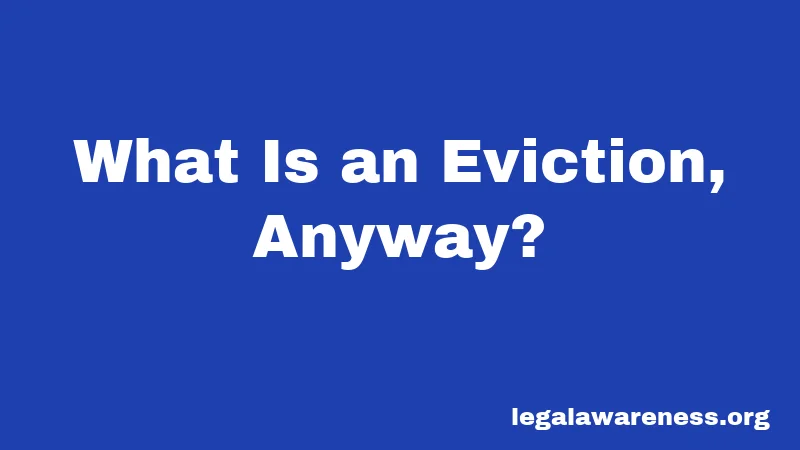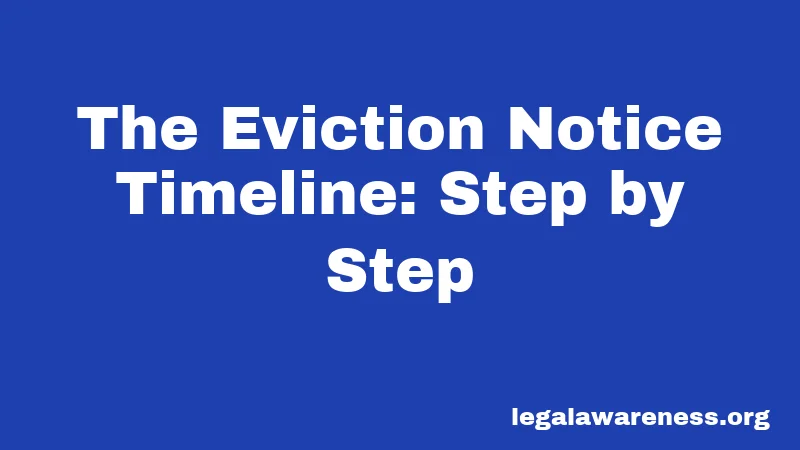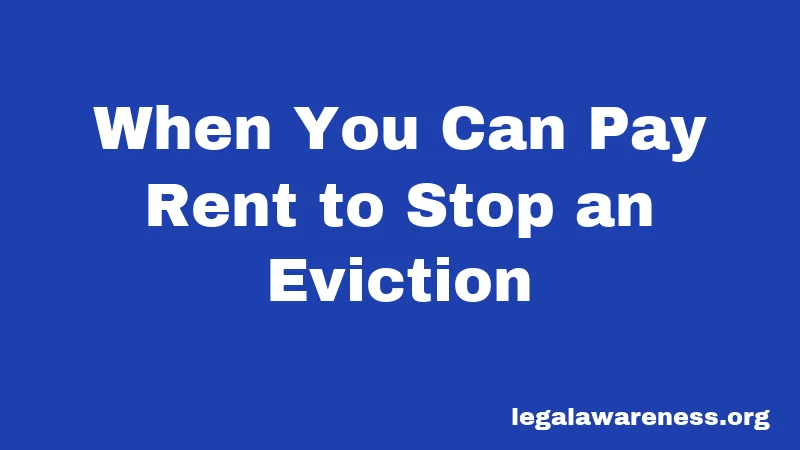Arizona Eviction Laws in 2026: What Renters and Landlords Really Need to Know
Most people have no idea how strict Arizona’s eviction laws actually are. Seriously. But whether you’re renting an apartment in Phoenix or a house in Tucson, these rules matter. And they can hit hard if someone doesn’t follow them. Let’s break down exactly what you need to know.
If you’re a tenant worried about losing your home, this guide explains your rights. If you’re a landlord thinking about removing a tenant, this explains the legal path you must follow. Either way, knowledge is power here.
What Is an Eviction, Anyway?

Think of an eviction like this: it’s when a landlord uses the court system to force a tenant to leave a rental property. Landlords can’t just change the locks or kick someone out on their own. Nope. They have to go through the courts. That’s Arizona law, and it’s pretty firm about it.
Landlords cannot evict tenants or force them to vacate without a valid reason, which is called “just cause.” The reason needs to be something specific and legal. Breaking the lease. Not paying rent. Causing damage. Those count. Random reasons? Those don’t.
Arizona uses a law called the Arizona Residential Landlord and Tenant Act to govern how all this works. Sound boring? Maybe. But it’s basically the rulebook for renting in Arizona.
The Basic Reasons You Can Get Evicted
Here’s where it gets real. There are several solid reasons a landlord can start eviction against you.
Nonpayment of Rent
This is the big one. Not paying rent is the most common reason for eviction in Arizona. When payment is overdue, the landlord must serve an official 5-Day Notice to Pay before starting the eviction process. You get five calendar days to pay what you owe. That’s it. Not five business days. Five actual days.
Here’s the important part: if you pay the full amount during those five days, everything stops. The eviction doesn’t happen. But if you don’t pay? The landlord can file the eviction case right after.
Not sure if rent is late? Here’s a quick rule: rent is considered late the day after its due date unless the lease includes a grace period. So if rent is due on the first and you don’t pay, technically you’re late on the second. Most leases don’t include grace periods, so play it safe and pay on time.
Breaking the Lease Agreement
Your lease is basically a contract. Breaking it is grounds for eviction. Common violations include subletting without permission, having an unauthorized pet, or damaging the unit. Painting walls bright colors without the landlord’s approval? That counts too.
If a tenant violates a lease term, the landlord must issue a 5-Day Notice to Comply to allow the tenant time to fix the problem. You get a chance to make it right. Fix the violation within five days, and you’re good. But you have to actually fix it.
Health and Safety Code Violations
Arizona landlords can evict for serious health and safety problems. We’re talking about letting garbage pile up. Disabling smoke detectors. Breaking plumbing. Things that create hazardous conditions.
Landlords should give tenants at least 5 days to correct the issue. But here’s the important part: if it’s an emergency, the landlord might be able to fix it themselves and charge you for the repairs.
Illegal Activity on the Property
This is serious. If a tenant engages in illegal behavior inside the rental unit, the landlord can act. The tenant still gets a written notice, but the timeline is shorter than with other violations. Sometimes it can be immediate.
The Eviction Notice Timeline: Step by Step

Okay, stay with me here. This is important, and it’s the part most people get confused about.
Step 1: The Written Notice
Your landlord can’t just tell you to leave. The notice must be written down. It has to have your full name and address, and it must be signed and dated by your landlord. A text message doesn’t count. A conversation doesn’t count. It has to be actual paper or official documentation.
The notice must also explain exactly what you did wrong. And it must tell you how many days you have to fix it or leave.
Step 2: The Waiting Period
In Arizona, you have a minimum of 5 days between your landlord giving you a notice and them filing an eviction lawsuit against you in court. So if you get a notice on Monday, they can’t file in court until at least the following Monday.
For month-to-month tenants without a specific lease, the notice period is longer. 30 days notice is required for tenancies of 1-2 years. 7 days notice can be given for tenancies less than 1 year. That’s if the landlord is terminating without cause. If there’s a lease violation, the timelines are different.
Step 3: Court Filing
If you don’t fix the problem or move out during the notice period, your landlord can file an eviction lawsuit. This is called a “forcible detainer” or “special detainer” action in Arizona. Fancy legal terms, but basically they’re asking the court to force you out.
Once they file, the court sends you official papers. You have between 3-6 business days to respond. This is critical. You can contest the eviction in court.
Step 4: The Hearing
The tenant has at least 2 days before the eviction hearing to prepare. This is your chance to defend yourself. Maybe you did pay the rent but have proof the landlord didn’t receive it. Maybe the notice was served incorrectly. Maybe the landlord failed to maintain the property. These are all valid defenses.
The judge will listen to both sides. The landlord needs to show evidence that their claim is legitimate. Photos, documentation, lease agreements. If the judge rules against you, you get time to appeal.
Step 5: After the Judgment
If the judge rules in favor of the landlord, the tenant has 5 days to appeal the ruling. But if the eviction is for illegal activity, then the tenant only has 24 hours to appeal. That’s a huge difference. Illegal activity appeals have a very short window.
If you don’t appeal or your appeal fails, you have to move out. If you don’t, the sheriff will physically remove you. That’s the final step.
Important: What Landlords CANNOT Do
Hold on, this part is critical. Listen up.
Arizona statutes strictly bar landlords from bypassing the courts to remove tenants. Actions such as changing locks, turning off utilities, or disposing of a tenant’s belongings without a judicial order are explicitly forbidden.
Some landlords try to speed things up by taking matters into their own hands. Wrong move. That’s illegal, and the tenant can sue for damages. A lot of damages. So landlords have to follow the legal process every single time. No exceptions.
When You Can Pay Rent to Stop an Eviction

Here’s good news: you have a superpower during eviction. Well, kind of.
If the eviction is for nonpayment of rent, you can stop it by paying the full amount owed. But timing matters. If you pay what the notice says you owe before your landlord files a lawsuit to evict you, you only have to pay that amount. If you pay after the landlord has filed to have you evicted but before a court orders an eviction, you may also be responsible for attorney fees and court costs.
Translation? Pay fast. The faster you pay, the cheaper it is for you.
What If You’re Struggling to Pay Rent?
Wondering if there’s help available? Good question. The answer is yes, sometimes.
Pandemic-related assistance has come to an end. But cities, churches, and other non-profit organizations may have help available. Contact your local city government or search for “rental assistance” in your county. You might find programs that can help.
But do it NOW. Don’t wait until you’re already behind. Talk to your landlord first and see if you can arrange a payment plan. Most landlords would rather work with you than go through eviction. It’s expensive and time-consuming for them too.
Special Rules: Domestic Violence
Arizona has special protections for victims of domestic violence. If you’re a victim and you need to break your lease, there are ways to do it without penalty. The law even allows the protective order to extend to the entire property if needed.
This is important: if you’re in an unsafe situation, you’re not trapped by your lease. Get help. Contact local domestic violence resources or your landlord about early termination due to safety concerns.
Tenant Rights: If Your Landlord Isn’t Making Repairs
What if your landlord is a slacker about repairs? You do have options. But here’s the thing: rent strikes are illegal in Arizona. Don’t withhold rent hoping to force repairs. That will backfire, and the judge will probably order you to pay.
Instead, you can use something called “self-help for minor defects.” If repairs cost under $300 or less than half your monthly rent (whichever is more), you can hire a contractor yourself and deduct the cost from your next rent payment. But you have to follow the process carefully. Give the landlord 10 days to fix it first (less in emergencies). Get an itemized receipt and a lien waiver from the contractor. Then submit those documents to the landlord before deducting from rent.
For serious repairs that affect health and safety, the rules are stricter. You might be able to break the lease or withhold rent, but only after giving proper notice. Get legal help for this one.
The Cost of Eviction in Arizona
Let’s talk money. Court costs for evictions in Arizona typically range from $150 to $300 in filing fees, depending on your county. If a tenant contests the case, costs go up. Add attorney fees if either party hires a lawyer, and suddenly you’re talking real money.
For landlords, an eviction is expensive. For tenants who get evicted, it’s worse. An Arizona law which took effect September 24, 2022 requires eviction records be sealed when the court enters an order dismissing the case prior to a judgment, the court enters a judgment in favor of the tenant, or the landlord and tenant stipulate to set aside, vacate, and seal the judgment.
This is huge. If you can get the case dismissed or work out a settlement with your landlord, you can ask the court to seal the record. That means future landlords might not see it on background checks. It’s not guaranteed, but it’s possible.
What Happens After Eviction: The Record
Here’s what worries a lot of people: will this wreck my rental history?
Courts do not directly report judgments to credit agencies. However, landlords may. Credit reporting agencies also purchase court data to build their databases. So even though the court doesn’t report it automatically, it can still end up on your record.
This is another reason to try settling with your landlord if possible. If you can both agree to dismiss the case, you might be able to seal it and keep it off your permanent record.
No-Cause Eviction: Month-to-Month Tenants
If you’re on a month-to-month lease without a fixed term, the rules are different. If the tenant is on a month-to-month tenancy without a lease, the landlord can terminate the tenancy without having to provide a reason. The landlord simply needs to provide a written 30-Day or 7-Day No-Cause Termination Notice.
So your landlord can basically ask you to leave without explaining why. That’s the trade-off with month-to-month living. You get flexibility, but less protection.
How much notice? 30 days notice is required for tenancies of 1-2 years. 7 days notice can be given for tenancies less than 1 year. This assumes it’s a no-cause termination. If you violate the lease, they could potentially move faster.
Retaliation: Landlords Can’t Punish You
Here’s a rule that protects tenants: landlords can’t retaliate against you for certain actions.
If you’ve complained about repairs, reported a code violation, or exercised your legal rights, your landlord can’t evict you as punishment. That’s illegal. If your landlord tries this, it’s retaliatory, and you have defenses in court.
The key word is “timing.” If you complain on Tuesday and get an eviction notice on Wednesday, that looks really suspicious. The court will probably see through it.
Frequently Asked Questions
How many days does a landlord have to give for nonpayment of rent?
Five days. It’s a 5-Day Notice to Pay or Quit. If you pay within five days, the eviction stops. If you don’t, they can file in court after those five days pass.
Can a landlord evict me immediately without notice?
No, except in very rare situations. Almost every eviction requires some form of written notice. Illegal activity sometimes has a different timeline, but it’s never truly immediate. Due process matters in Arizona.
If I get evicted, will it ruin my chances of renting again?
It will make it harder, yes. Background checks can reveal evictions. But if you can get the record sealed, your chances improve significantly. It’s worth asking your landlord about settling.
What should I do if I get an eviction notice?
Don’t panic. Read it carefully. Make sure everything is correct. You can respond in court within 3-6 business days. Consider getting legal help. Many Arizona cities have legal aid organizations. Contact them immediately.
Can I still pay rent after being evicted if I’m behind?
Yes, you can try. But after a lawsuit is filed, you might owe court costs and attorney fees too. Paying early is always better than paying late.
Final Thoughts
Arizona’s eviction laws exist to protect both landlords and tenants. They’re strict, but fair. Landlords have to follow procedures. Tenants have time to respond. Neither side can just do whatever they want.
If you’re renting in Arizona, know your rights. Keep records of your rent payments and any communication with your landlord. If you’re facing eviction, act fast. Get legal help if you need it. If you’re a landlord, follow the law exactly. Missing one step can get your case thrown out.
The bottom line? Eviction is serious business. But understanding the rules gives you power. Use it.
References
Arizona Residential Landlord and Tenant Act (A.R.S. §§ 33-1301 to 33-1381)
Maricopa County Justice Courts – Evictions
Arizona Supreme Court – Eviction Actions
